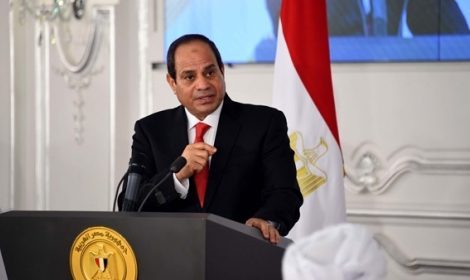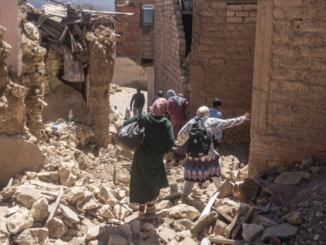
– Al-Sisi stated that the Egyptian military can impose its full control over the country within 6 hours
Abdel Fattah al-Sisi said in a speech on Monday during the inauguration of the “Gheit El Enab” project for Urban Development in Alexandria, that there is a plan to deploy the armed forces throughout Egypt in 6 hours if something wrong happened.”
Al-Sisi said, No one can harm Egypt, and we won’t allow Egypt to be lost from us.” He added, “We put a plan to deploy the military in Egypt within 6 hours if something wrong happened,” No one thinks that we can leave Egypt or allow the country to slip from our hand.”
He also praised the Egyptian Armed Forces and the police saying that they are strict and powerful.
The controversial words regarding the military deployment throughout the country in only 6 hours raised many debates among Egyptians. Political analysts and powers believe that al-Sisi is creating an “illusion” to export the idea of external threats and conspiracies against the country to cover his failures and crises in many issues.
Since the military coup in 2013 that Egyptian Armed Forces have extended its power in the country in an unprecedented way on the economic, social, civilian and political levels.
However, many experts believe that the Egyptian Armed Forces’ extension of its power in the civilian activities will have negative repercussions on its main role of protecting the country’s borders and territories, recalling the armed forces role during Gamal Abdel Al-Nasser when the army left its main role of securing the countries’ national security, resulting in the loss of war in 1976.
In the same context, al-Sisi defended the Egyptian armed forces in his speech claiming that “The Armed Forces don’t put any money even a pound in their pockets; no one takes even one pound without accountability.” He added, “All the expenses inside the military are spent according to the orders of me and of the defense minister, with complete transparency.”
The military in Egypt has swept in all the countries’ activities, starting from dominating the political positions from the presidency that was usurped by Abdel Fattah al-Sisi, who led a military coup that brought him to power, as well as a large number of ministers with a military background (a number of army generals appointed as ministers, not necessarily military-related ministries).
Among these areas penetrated by the military were: the administration of governorates (provinces), districts, universities, research centers, the national institutes, the consumer’s protection associations, sports stadiums, public hospitals and foreign schools (schools teaching foreign curricula such as the American, British and Canadian diplomas), the boards of directors in holding companies and the oil and natural gas sectors and others.
Moreover,the Egyptian Armed Forces has recently penetrated in nearly every economic activity in the country as well as the civil services that should be implemented by the government, nevertheless the Egyptian Armed Forces budget is not subjected to any supervision.
In March 2014, the Washington Post said that the Egyptian Armed Forces control nearly 60% of the Egyptian economy pointing that the revenues of these projects aren’t announced to the Egyptian public.
Economically,the Egyptian Armed Forces controls the infrastructure of the country and land ownership. In February 2014, the Egyptian arm of UAE’s construction company Emaar Misr announced that it paid EGP 72m to the armed forces to “modify the conditions of the units affiliated to the armed forces in the Uptown Cairo project area”.
The company also spent EGP 60m to construct alternative military facilities in return for using the western part of the land of Uptown Cairo. In order for Emaar Misr to continue working on the project, it had to sign a cooperation protocol with the Ministers of Defence, Investment and Local Development.
In addition, the Egyptian military owns companies in different fields with around 2 million personnel, such as cement, fertilizers, televisions, refrigerators and foodstuff. The Egyptian army owns hospitals, hotels, clubs and child-care centers.
Moreover, the armed forces re-entered the scene in 2011 when it rebuilt a church in Etfeeh village in Upper Egypt that was burnt down in a sectarian attack in March of that year.
The armed forces constructed two vital roads, the ring road and the Cairo-Sokhna road, in addition to developing the Cairo-Ismailia road and the Cairo-Suez road. The toll gates also on these roads came under the administration of the army-run National Railways Company. It also built eight bridges in different governorates, and three axes.
Moreover, the military have constructed an airport in the Sohag governorate in Upper Egypt and a port in Hurghada.
With regard to sports projects, the armed forces developed stadiums and sports clubs. It also built several hospitals and government-owned clubs, educational institutions and tourist spots.
Regarding its role in civilian activities,the Egyptian Ministry of Supply gave away its responsibility in managing the subsidy card system to the Ministry of Military Production, and the Awkaf (Religious Endowment) Ministry’s authorization of the Ministry of Military Production to sell 10,000 acres of land related to Al-Awkaf to investors, which ensures the accusations raised against the military institution that it seeks to fully control all the economic and civil activities in Egypt.
The recent roles dominated by the Ministry of Military Production are added to other projects that have been dominated by the military such as automating the agriculture property documentation and a contract for constructing a new building for the Lawyers Syndicate which is consistent with the military institution’s penetration of the Egyptian politics and economy in general.
In addition, the Egyptian Armed Forces have taken the responsibility to provide the subsidized infant milk when the crisis of infant milk shortages escalated. The parliamentary health committee said that they should leave it up for the Armed Forces to either provide dollars to be able to import the necessary products or to import through the Armed Forces. When crisis of the severe shortage of subsidized infant milk escalated in Egypt, Egyptian Minister of Health Ahmed Emad said that the Egyptian Armed Forces pumped 30 million packages of infantry milk in the pharmacies for 30 pounds each instead of 60 pounds.


